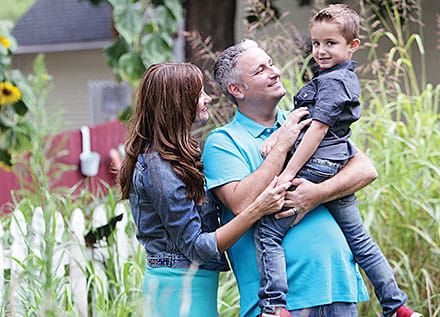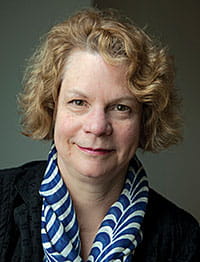How Vaccines Improve Child Health

Almost losing their son, Max, to the flu made Jaime and Mike strong advocates for the flu vaccine.
They Help Save Lives, Fight Infectious Diseases
When you see Max, you’d never believe this energetic 5-year-old ever had a sick day – let alone that he almost lost his life to something as commonplace as the flu.
In 2012, his parents, Jaime and Mike, had their hands full with Max and his twin brother, Zac. Never seen without their superhero capes, the boys were hardy and healthy, running around, saving the world and stopping bad guys.
Then both boys got the flu. At first, it seemed like it would be a typical bout with the illness – both Zac and Max would be miserable and feverish for a few days, and then bounce back.
But, after five days, Max was getting worse. “He was lethargic, not talking and his fever was around 105 degrees. It was so high that we thought the thermometer must be broken,” Jaime remembers.
Frantic with worry, she and Mike rushed Max to his pediatrician, only to find his fever had gone even higher. It was clear that Max needed advanced care quickly, so he was sent to Cincinnati Children’s Liberty campus. There, Max was stabilized and then transferred by ambulance to the Pediatric Intensive Care Unit (PICU) at our Burnet Campus.
“I couldn’t believe it. The doctors and nurses probably thought I was crazy because I kept saying, ‘But he only has the flu,' " Jaime says.
That was just the beginning of Max’s battle for his life.
Fighting the Most Dangerous Foes
The Division of Infectious Diseases at Cincinnati Children’s is not one that gets a lot of public attention. Yet, it has been a center of innovation and hope for kids facing potentially deadly illnesses for more than half a century.
A catchall phrase for any illness or injury caused by a bacterium, virus or fungus, “infectious disease” encompasses a lot of childhood illnesses – from mild common colds and the flu to diseases like polio and cholera.
For the most part, the illnesses are relatively mild and in the United States, a routine vaccination schedule keeps the worst of childhood illnesses at bay. Even so, infectious diseases are the No. 1 reason kids are admitted to the hospital in the United States. Worldwide, they are the No. 1 cause of childhood mortality.
Those are the statistics that fire the passions of Margaret “Peggy” Hostetter, MD, who joined Cincinnati Children's in 2012 as the director of infectious diseases, and was recently appointed director of the Cincinnati Children's Research Foundation and Chief Medical Officer.
Eyes lighting up, Hostetter leans forward slightly. “It’s simple – developing vaccines is the single best tool we have to improve child health,” she says. “Vaccines are safe, effective and cost-efficient – and they’ve been responsible for eradicating some of the worst childhood diseases in history.”
Cincinnati Children’s has a long and renowned history in leading the fight against infectious diseases. Albert Sabin, MD, developed the oral polio vaccine here in 1962. More recently, our infectious disease experts created a vaccine for rotavirus that has been instrumental in saving the lives of hundreds of thousands of children worldwide.
Beating the Odds
Max fought for his life in the PICU. His battle with the flu weakened his immune system, making it easy for other infections to take hold.
“Max ended up with the flu, pneumonia, respiratory syncytial virus (RSV) and a bacterial infection. He was on a ventilator and went into cardiac arrest. It took seven minutes to revive him,” Jaime pauses, looking down at her hands. She takes a shaky breath and continues. “Then, about five days later, while we were still in the hospital, I noticed something else was wrong – he was no longer talking.”
A virus had infected Max’s brain. He couldn’t speak and was weak from fighting infection after infection. Max’s best hope was that the virus would run its course and he would get better. But there was no guarantee – the infection could scar his brain, and Max may never talk, sit up or walk again.
It seemed an impossible situation to Jaime and Mike – it started out as the common flu. And, yet, that very ordinary illness could rob them of their bright, silly, superhero-obsessed little boy.
But, Max, just like the superheroes he idolized, fought hard to get well. Over the course of several days, he regained the ability to breathe on his own, to laugh, and finally – much to his parents' relief – talk.
“I’ll never forget the date – March 27, 2012,” Jaime smiles. “He got mad and said, ‘No!’ That stubborn, angry ‘no’ was the sweetest sound I’d ever heard.”
Not long after, Max moved to the rehabilitation floor and began a long journey to regain his strength. All in all, Max spent close to a month in the hospital – all because of the flu.
Dedicated to Saving Lives
Hostetter first learned about infectious diseases when she contracted pneumonia at 4 years old. Being sick is bad enough for an active and inquisitive child, but being confined inside while she recuperated was almost more than she could bear.
“I couldn’t go outside and play and didn’t understand why,” Hostetter recalls. “So I asked my mother what made me so sick, and she told me it was a germ.”
That answer wasn’t enough for Hostetter, so she pressed her mother for more information. A former physician, Hostetter’s mother handed her a book to look through – the Handbook of the Common Acute Infectious Diseases.
“I couldn’t read the book,” Hostetter says, “but it had drawings of kids suffering from diseases like chicken pox and measles. I remember thinking two things – one, there were kids worse off than I was and two, I wanted to stop those diseases.”
And Hostetter has spent her life working toward that goal.
She’s helping to lead Cincinnati Children’s in the fight against infectious diseases. Hostetter has been instrumental in not only growing both the research and clinical programs of the Division of Infectious Diseases, but in her new position as director of the Research Foundation at Cincinnati Children's, she’s focused on making sure the best and brightest researchers and clinicians are here.
“I came to Cincinnati Children’s for one reason – I wanted to be a part of an organization that is 100 percent dedicated to saving children’s lives. Every one of us who contributes to the clinical and research missions can think of that one child who made us say, ‘I’ve got to figure this out,’ ” Hostetter says.
Illness Leads to Advocacy
Much like Hostetter’s illness led her to become a doctor and advocate for children, Max’s battle with the flu inspired his family to become advocates for Cincinnati Children’s and the importance of the flu vaccine.
“When I think about what we lived through, I always come back to one thought – this was JUST the flu. But my perfectly healthy 3-year-old almost lost his life,” Jaime says. “Today, we want to help people understand the importance of flu vaccines and the good work Cincinnati Children’s is doing.”
To give back, Jaime, Mike and their friends and family raise money for Cincinnati Children’s through Cincinnati Walks for Kids. Last year, their team, To the Max, raised nearly $8,000 to help fund research and care that saves kids’ lives, while also raising awareness about the importance of getting a flu vaccine every year.
Jaime is emphatic. “The flu vaccine saves lives. And we need research to make sure we keep coming up with effective vaccines that will attack other deadly illnesses.”
“Pediatricians always have their eyes to the future,” Hostetter says. “At Cincinnati Children’s, that means making sure our experts continue to drive innovation and discovery for a host of childhood diseases, including new vaccines and treatments for infectious diseases.”
Taking the long view of the fight to cure child-hood diseases is key to Hostetter’s vision. From bringing on board the best of the next generation of experts, to increasing financial support for research to combat diseases, she plans to ensure that Cincinnati Children’s is always on the leading edge of discovery.
How to Help
To learn more or support our work in vaccines, contact Marianne Requarth at 513-636-1166 or marianne.requarth@cchmc.org.
 Fighting infectious diseases isn’t the only passion driving the work of Margaret “Peggy” Hostetter, MD, at Cincinnati Children’s. Mentoring the next generation of experts is also high on her list. “We’ve got a wealth of experience and expertise here within our senior faculty,” she observes. “I want to leverage that to help the younger researchers and clinicians reach their goals, and, by extension, help Cincinnati Children’s advance our care and research into the future.”
Fighting infectious diseases isn’t the only passion driving the work of Margaret “Peggy” Hostetter, MD, at Cincinnati Children’s. Mentoring the next generation of experts is also high on her list. “We’ve got a wealth of experience and expertise here within our senior faculty,” she observes. “I want to leverage that to help the younger researchers and clinicians reach their goals, and, by extension, help Cincinnati Children’s advance our care and research into the future.”


